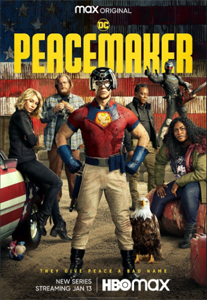“Peacemaker” (Thursdays, HBO Max), the first DC Extended Universe TV series, rehabilitates the title character, the least likable member of last year’s “The Suicide Squad.” Creator-writer-director James Gunn succeeds because this is a true rehab story: He doesn’t merely lazily rewrite the superhero who aims to achieve peace, “no matter how many people I have to kill.”
Self-improvement
Admittedly, it makes a difference that Peacemaker (an excellent John Cena) is the main character now. He’s capable of feeling emotions – an off-the-books op teammate observes he is “sad” – but Homelander from “The Boys” feels emotions too, and he’s demonstrably pure evil.
Peacemaker privately acknowledges that Rick Flag’s last words were right: Peacemaker (and by extension his philosophy of achieve peace through killing) is “a joke.” It’s clear from the three-episode premiere (the show will continue with one episode per week) that Peacemaker aims to be a better person for internal reasons, as opposed to worrying about his image, as per Homelander.
“Peacemaker” Season 1 (2022)
Thursdays, HBO Max (three episodes have been released)
Creator: James Gunn
Stars: John Cena, Danielle Brooks, Jennifer Holland
Despite the internal strife, “Peacemaker” shouldn’t be confused with the brooding street-level MCU Netflix shows from last decade. This one is funny, and it’s a hard R (to borrow movie rating terminology) for its sense of humor as much as its sex and violence. DC unleashes Gunn to do what he does in his purest form, as crystalized in “Super” (2010). (“The Suicide Squad,” while edgier than “Guardians of the Galaxy,” still has mainstream leanings.)
I’m always worried that Gunn’s work will play as mean-spirited. Indeed, Gunn got in trouble with Disney and some of the public for bad-taste jokes on Twitter a few years back. (He used a masterful apology and sense of penance to come out of it more respected than before, a more remarkable achievement even than his great films.)
Toeing the comedic edge
In “Peacemaker,” Gunn toes that line without crossing it. For instance, Peacemaker (real name Chris) always calls black-ops tech guy John (Steve Agee) “Dye-Beard.” But alone in his trailer, Peacemaker chastises himself for botching a chance to make a friend.
Gunn’s experience with accidentally offending the masses make him the ideal person to make a “woke”-era show without lecturing us. The black-ops team includes woman Harcourt (Jennifer Holland), black gay woman Leota (Danielle Brooks) and black Murn (Chukwudi Iwuji).
Their genders, races and sexual orientations are relevant but don’t define them. Harcourt is a hard-ass, Leota is humorously insecure in the gig and has a secret (she’s the daughter of Amanda Waller, played by DCEU veteran Viola Davis), and Murn is the humorless (“straight man” in comedy terms) leader who has a secret viewers don’t know yet.

Sex and violence are par for the course nowadays, so it’s most impressive that “Peacemaker” includes bigoted language, courtesy of Peacemaker’s dad Auggie (Robert Patrick, bravely sporting Chia Pet hair). We get everything from “f**,” which hasn’t been said on mainstream TV since the 1990s, to the more creative “egg foo young.”
Everyone is fair game
Note that when Auggie calls that same Asian-American police officer (Annie Chang as Sophie) “chopsticks,” she responds by calling him “fork.” “Peacemaker” is happy to make everyone ridiculous; it doesn’t coddle minority characters.
Sophie’s off-target insult leads to a chat with her colleague (Lochlyn Munro, always a welcome presence) about the art of the quick comeback. “Peacemaker” uses this approach a lot, and that’s why its plot can progress as slowly as those 2010s MCU shows yet be gleeful.
In another humorously long conversation, Peacemaker assumes Vigilante’s (Freddie Stroma) genitals will be exposed if he turns around and looks. He fears it will be a Louis C.K. situation, but Vigilante doesn’t follow the news, so Peacemaker has to explain the Louis C.K. controversy.
Along with these loosely written scenes, Gunn can also be efficient in his world-building. In the opening where Peacemaker is released from the hospital after “The Suicide Squad’s” events, he chats with a janitor to learn about the state of the world.
The exchange is funny, including the suggestion that Aquaman “f***s fish,” but it skillfully reminds us that 1, Peacemaker has been out of the loop during his four-year imprisonment; 2, superheroes are well-known in this world; and 3, Peacemaker is not one of the respected superheroes. (People label him “murderer” and “supervillain.”)
Another trick in his bag: The music
The series’ special effects are hit and miss. Peacemaker’s pet/best friend Eagly looks great, but when Peacemaker fights a catlike metahuman (who isn’t “Wonder Woman 1984’s” Cheetah, but similar), her face looks blurry, like an unpolished face swap from stuntperson to actress.
As with “The Suicide Squad,” which uses monster design to memorable effect in the finale with the Starfish creature, Gunn only uses effects when needed; most of the humor and the show’s sense of play comes from his old-school sensibility.
Along with off-color jokes, Gunn isn’t shy about putting his musical tastes into his work, and bad (but almost good) Eighties power pop feels right for Peacemaker – even though Cena, born in 1977, was a Nineties youth. (But, hmm, maybe Peacemaker had an older sibling? And besides, power pop continued beyond the Eighties. The opening-credits song, “Do You Wanna Taste It,” is a 2010 track from Wig Wam.)
We get deeper cuts – like the Quireboys’ “I Don’t Love You Anymore” (1990) — than we find Johnny spinning on “Cobra Kai.” So it dodges that comparison, just as Peacemaker is not quite Homelander, and he’s not quite Captain Hammer from “Dr. Horrible.” He’s not quite biting satire, not quite pure joke; he’s a person.
Again, Gunn finds that delicate balance between the ridiculous and the real, and I remain thankful that he survived the woke-era witch hunts.

